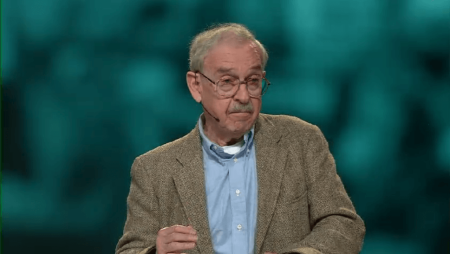White Evangelicals Should Support Black Lives Matter as Pro-Life Issue, Says Ron Sider

Ron Sider, professor emeritus at Palmer Theological Seminary in Pennsylvania and founder of Evangelicals for Social Action, charged Thursday that white Evangelicals should get behind the Black Lives Matter movement because it is a pro-life issue.
Sider, who Russell Moore, president of the Ethics & Religious Liberty Commission of the Southern Baptist Convention, introduced at the Evangelicals for Life conference in Washington D.C. as "a model of Christian conviction and courage," criticized parts of the pro-life movement for what he sees as a "fundamental inconsistency" in how life-threating social causes beyond abortion, like racism and poverty, are treated.
"For many decades, I have believed and taught that Christians should act on the belief that from the moment of conception we're dealing with persons, human beings made in the image of God. Choosing to end the lives of innocent persons is simply wrong. For many decades therefore, I have been a part of the movement to reduce abortion by legislation and through supporting programs to assist unwed pregnant mothers. I'm happy my friends and honored to be a part of this gathering," Sider noted in his delicately balanced comments.
"But over the years, I've also been disturbed by what seems like a fundamental inconsistency in some parts of the pro-life movement. They talk a lot, rightly about combatting abortion, but often seem unconcerned with poverty, starvation and smoking, environmental degradation and racism, and capital punishment also destroy the lives of persons made in the image of God," he said.
Sider then took the time to demonstrate why each social issue he mentioned is a pro-life issue before discussing how he saw the Black Lives Matter movement.
"Pro-life people should be concerned with every situation where death that could be prevented kills persons created by our Lord and Savior," he said.
"Racism, my friends, is also a pro-life issue. We all know how dreadfully true that's been in our painful history. Racism made it possible for us for centuries to enslave tens of millions of Africans made in the image of God. And after slavery ended, thousands of lynchings murdered African-American men. Today I ask you, what should white Evangelical pro-life people think about the movement Black Lives Matter?" he asserted.
"Now, let's be clear, by no means do I mean to say that every instance where a white policeman shoots a black person is due to racism, but truly, some of the specific cases reported in the last couple years point to racial prejudice as part of the problem," he said, citing a poll showing the strikingly opposing views people in the black and white communities have on extrajudicial police killings.
"This poll shows that 80 percent of African-Americans think that the many recent instances where police killed African-Americans is part of a much larger pattern of police mistreatment of African-Americans, 70 percent of white Christians think exactly the opposite," said Sider.
"Would it not be an amazing thing if white pro-life Evangelicals said: 'We don't know exactly how much racial prejudice continues to exist among the police but we will listen to our black brothers and sisters in Christ, we will say clearly with them that black lives matter as much as white lives.' That does not mean that we need to think that most policemen are racially prejudiced. It only means that we are opposed to any situation where even one person dies because he is a young black man," he said. "I think there is probably nothing that white Evangelicals could do to persuade more African-American Christians to join the pro-life movement against abortion than for us to say that precisely because we are consistently pro-life we join them in insisting that black lives matter."
Sider, who drew cheers from the crowd, acknowledged that there is a moral distinction between abortion and these other pro-life issues because abortion involves a direct intent to take human life. He argued, however, that they are also important issues that the pro-life movement needs to consider.
"It was not entirely unfair when some joker said it looked as if we believe life begins at conception and ends at birth," said Sider.
"It bothered me when I saw that some pro-life leaders opposed government funding, for example, to search for a cure so that people with AIDS would be able to live. It bothered me when an important pro-life senator fought to end abortion but then defended government subsidies for tobacco. It bothered me when pro-life advocates failed to support programs designed to reduce hunger and starvation and thus save the lives of millions around the world. I agree, my friends, with Pope Francis, who said when he spoke to the Congress last year that Christian faith teaches 'our responsibility to protect and defend human life at every stage of its development,'" he said.





















